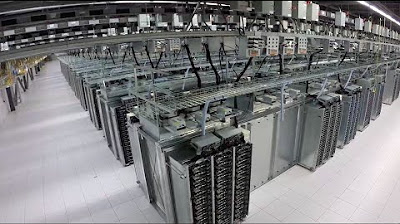Welcome to the Internet - Old
Summary
TLDRThis module explores the internet's concept, operation, and its profound societal impact. It explains the internet as a global network of computers facilitating communication through standardized protocols. The video highlights the internet's democratization of information, its growth in popularity, and its role in enabling collaboration, communication, crowdsourcing, e-commerce, and online learning. It also addresses the internet's challenges, including legal issues, anonymity, and censorship.
Takeaways
- 🌐 The internet is a global network of computers that allows for the sharing of information and communication between people worldwide.
- 📚 It embodies the philosophy of making information and knowledge accessible to everyone, breaking historical barriers of access.
- 🔄 The internet operates on open protocols that standardize communication between machines, akin to a common language.
- 📈 From 2005 to 2014, internet usage grew significantly, with 40% of the world's population online, highlighting its rapid adoption.
- 🚀 The internet has revolutionized communication, enabling instant messaging, video calls, and social media to connect people across the globe.
- 🔍 It has also transformed how we find and consume information, with platforms like Google facilitating quick access to vast amounts of data.
- 💼 E-commerce, including online shopping and crowdfunding, has been greatly influenced by the internet, offering new ways to buy and fund projects.
- 🎓 Online learning has become more prevalent, providing access to educational resources and courses that were previously unavailable to many.
- 🌍 The internet has enabled global collaboration, such as in scientific research and problem-solving, through platforms like Foldit.
- 📊 It has also led to the creation of vast amounts of data, with millions of emails, tweets, and searches happening every second.
- 🆓 While the internet provides access to a wealth of information, it also raises ethical concerns about privacy, anonymity, and censorship.
Q & A
What is the fundamental concept of the internet?
-The internet is fundamentally a philosophy of making information and knowledge open and accessible to all.
How does the internet work at a physical level?
-At a physical level, the internet is a network connecting networks, spanning across the globe and allowing individual computers to communicate with each other.
What are protocols in the context of the internet?
-Protocols are widely agreed upon sets of rules that standardize communication between machines, allowing them to communicate and interpret data in the same way.
How has the internet enabled communication between humans?
-The internet has enabled communication by allowing any human with an online machine to communicate with any other human who has internet access.
What was the global internet penetration in 2005 and 2014?
-In 2005, only 16% of the world was online, while in 2014, that number increased to 40%.
What are some of the daily statistics of internet usage mentioned in the script?
-In one second, there are over 7,000 tweets, over 2,000 Skype calls, over 53,000 Google searches, and about 2.5 million emails sent.
How has the internet impacted society in terms of collaboration and information sharing?
-The internet has enabled collaboration across fields and countries, and has significantly enhanced the spreading of information.
What is an example of how the internet has enabled crowd sourcing?
-Crowd sourcing is exemplified by platforms like Kickstarter and Indiegogo, where individuals can fund projects and ideas collectively.
How has the internet affected communication methods?
-The internet has revolutionized communication through email, video calls, and social media, making instant communication and global interaction possible.
What is an example of collaborative problem solving enabled by the internet?
-The online game Foldit is an example where players solved the structure of an AIDS-causing virus in 10 days, a problem that eluded researchers for 15 years.
How has e-commerce been influenced by the internet?
-E-commerce has been greatly influenced by the internet, enabling online shopping and crowdfunding, and allowing for better price comparison and access to global markets.
What are some legal and ethical concerns associated with the internet?
-Legal and ethical concerns include access to copyrighted material, anonymity leading to cyberbullying, and censorship by governments or service providers.
Outlines

This section is available to paid users only. Please upgrade to access this part.
Upgrade NowMindmap

This section is available to paid users only. Please upgrade to access this part.
Upgrade NowKeywords

This section is available to paid users only. Please upgrade to access this part.
Upgrade NowHighlights

This section is available to paid users only. Please upgrade to access this part.
Upgrade NowTranscripts

This section is available to paid users only. Please upgrade to access this part.
Upgrade Now5.0 / 5 (0 votes)





